Wednesday, May 10, 2006
Take a Bex, Elizabeth
Good Lord, Elizabeth Farrelly, the SMH's architecture and planning writer, gets very overwrought in her article in today's paper. It takes 3/4 of the article to get to the reason she's writing it: her objection to the New South Wales State government reviewing the Building Sustainability Index. (Which apparently requires energy and water efficiencies in new houses.)
She may be right; doing away with the index may well be short sighted. But to go on with a rant for the first page like this (talking from the point of view of explaining to our grandchildren what happened):
Instead, we chose to get richer, fatter and smugger. We had resources to burn and, my, we burnt them. What a fire it was. We let our fauna drift into extinction and our indigenes into indigence. Instead of harvesting wind, wave, hot-rock or sun energy, which we had in sparkling abundance, we sold our forests for toilet tissue, our rivers for cotton-farming, our space for radioactive waste, our military for oil. While old Europe poured her energies into sustaining big, dense populations on the few renewables she could muster, we, stuck in neutral, let the mining lobby draft our energy policy and the developers draft our urban plans. So, while the old world leapt forward we new worlders went on filling our air with fossil fuels and covering our remaining farmlands with fat, eaveless houses.
And yet, as the icecaps started to melt and the earth to drown, we sank ever deeper into denial.
And so on.
Doesn't she realise that such hyperbole doesn't serve her cause well? Don't ruin a decent argument by claiming the end of the world if you lose the debate.
The budget response
Really, this would have to be the best received budget I can ever remember.
But one thing I would suggest to the government for next year's pre-election sweetener. Go for a re-instatement of a reasonably funded dental health scheme for the pensioners. It is obvious that all of the States are just never going to fund this properly themselves (even though it is logically their responsibility.) It looks like a couple of hundred million dollars a year would replace the old scheme, which seems peanuts when the surplus is maybe $10 to $12 billion.
Tuesday, May 09, 2006
Panic over corporations power
Greg Craven, a professor of constitutional law (and the executive director of the John Curtin Institute) gets over-excited by the implications of a Commonwealth success on the current IR High Court case. He argues that, as most things are done by corporations, if the Commonwealth succeeds in controlling industrial relations this way, they will be able to control... everything.
There may be some point to some of his examples, although I am far from completely convinced about any of them. What I think is his most ridiculous example is this:
The school sector faces the same prospect. Numerous private schools are organised as corporations, and have nowhere to hide, yet even state schools should be feeling the cold breath of the Brindabellas on their necks. After all, what proportion of their students ultimately will work for corporations? Under an ascendant corporations power, a law regulating state school curriculums in the interests of their ultimate corporate employers is a tritely logical step.
So a power to govern corporations could be used to dictate to State governments the curriculum of non-corporate State schools? By no stretch of the imagination can I see that as plausible. (I guess that by signing up to some weird UN treaty it could happen under the external affairs power, but that is a different argument entirely. It is also an avenue more widely used on "progressive" issues than conservative one.)
Constitutional law professor or not, you need to a grip, Craven.
And as for Labor generally on this issue, the phrase "hoist on your own petard" seems most appropriate.
From an MI3 review
Returning from there, they don’t even make it to the office, having the misfortune, while crossing the Chesapeake Bay Bridge, to run into a barrage of air-to-ground missiles fired by a pilotless drone. I hate it when that happens.
And from The Sunday Times review:
..Yes, there’s one reference to America blowing things up in the Middle East and cleaning up financially, but it’s so silly, not even Noam Chomsky could take it seriously.
I wouldn't bet on that!
I haven't seen it yet. Maybe this weekend.
Real tough guys
Monday, May 08, 2006
On socialism
The article above on socialism, and its relationship to myth in particular, is interesting. I'm not sure if its explanation of Marx's views on revolution is entirely accurate, but certainly the idea that socialism serves the equivalent function of religion for many people does ring true.
Don't hold back, Theodore
Theodore Dalrymple really lets fly in this Spectator article, which seems to have appeared in The Australian on Saturday:
The doctrine of rights has borne putrid fruit. In the ward recently was a young woman of the now very extensive slut-babymother class, whose jaw was clenched in a habitual expression of world-destroying hatred. Her glittering saurian eyes swivelled mistrustingly, on the qui vive for infringements of her rights. She exuded grievance as a skunk exudes its odour.
I think Theo has retired recently (was this his last piece for The Spectator?) A pity in a way, but probably good for his blood pressure.
Noel Pearson talks sense
The article above is short, but again shows Noel Pearson's common sense on aboriginal issues. This part in particular rings true:
Welfare reform is only a part of the picture. True reconciliation would also mean that Aboriginal Australians could walk in two worlds; that they could seek work and education in places far away without losing the link to their homelands.
We must change the current system, because it does not provide incentives for young people and their parents to think about the future. There is no substitute for geographic mobility, education and work experience; without them, Aboriginal culture will collapse.
As I am sure I have said here before, the idea of all remote communities being able to be integrated into the national economy always seemed to be pie in the sky. (Sure, some might make it on art works or tourist ventures; but even those with mining employment available nearby have not always succeeded.) Lack of integration into the economy means poverty, hopelessness, and the vices that go along with those.
At least to the extent that it may have encouraged residents in remote and non-economically viable areas to stay there, the emphasis on land rights (with its talk of the spiritual need for "connection with the land") has actually worked against the interests of keeping a viable aboriginal culture alive.
Pearson seems to think that the land connection is still important to keep, and that is fair enough, as long as it does not encourage the kids actually stay there.
Sunday, May 07, 2006
Aspartame cleared - again
The Europeans have decided that an earlier study that raised a question about the safety of aspartame (as found in diet drinks) was flawed. (I had posted about the previous study before.)
So how much Diet Coke (or Pepsi Max) can you drink and be OK?:
"On the basis of the evidence," said Dr Pratt, "there is no reason to revise the previously established Acceptable Daily Intake (ADI) or to undertake any further revisions of the safety of aspartame."
The ADI is the level of additive considered to be safe if consumed every day over a lifetime without risk to health.
For aspartame, the ADI is set by the European Commission's Scientific Committee on Food (SCF) at 40 milligrams per kilogram of body weight.
An adult would have to drink about 14 cans a day of diet soft drink, or consume about 80 sachets of sweetener to reach this amount.
Drink up.
Friday, May 05, 2006
Nasty Surfdom
There are some arguments not even worth wasting your breath with, and I made a post to that effect. (Yes, I am the Steve. I did not put my url on the post, as there seems to be little here that its readers would agree with.) The post was meant to be slightly tongue in cheek, and of course I could expect some response to the effect of challenging me to argue against AB instead.
AB does do that, but in a style I find snide and overly personal, as indeed are comments below that. They then got onto the Cole response to the Hitchens article, the links to which are well worth reading. The Surfdom readers - well, the couple who referred to it - think Cole got the better of the argument. This I similarly find hard to believe, when Cole comes across to me as barely keeping it together.
No one has yet taken up my proposal that some one on the left should state the bleeding obvious responses to Aussie Bob.
Anyway, you can see why I consider Surfdom has become a very unpleasant place to post, or even visit much for that matter. It's rather reminiscent of posting at Webdiary in its heyday.
Update: Dunlop's pun obviously stuck in my brain. I originally referred to "Serfdom" in this post. Sorry.
The only option ?
Found via LGF was the above article that suggests waiting on the Iranian issue at the moment. Given the apparent difficulties of "surgical" military action in this case, and the possible regional consequences as well, this seems to be the only option at the moment. (Maybe Israel has nothing to lose if it embarks on some limited operation, but no one seems to think it can do it on its own.)
It's all about fun
Meanwhile in Britain:
The Guardian poll suggested that those quizzed were aware of women's declining fertility, but that they had to balance financial and work pressures against this.
However, most men (64%) and most women (51%) said it was more important for women to enjoy themselves than have children.
A majority also said they believed doing well at work and earning money can count for more than bringing up children.
The report says nothing about how this poll was taken. I suspect that if it was of readers of the left leaning newspaper, the results would be skewed against having children.
The Family Planning Association seems to downplay the fact that people waiting too long means not many people at all soon enough:
A spokeswoman for the Family Planning Association said things had changed both for women and men, with more choices and opportunities open to both.
"There are more things you can do in life, such as going off travelling and going to university.
"But it's actually quite a responsible thing to do, to wait until you are financially secure before having a family so that you can provide for your children."
This may be a reason for delaying children until you are able to work, but otherwise this line of thinking ("we can't start yet, we would have to put off that 3 month holiday in France") is really what fertility experts are trying to warn against.
The vanishing children of Japan
From the above:
The number of children in Japan has been falling for 25 years straight, highlighting the country's aging population and declining birthrate, an annual government survey showed Thursday....
Children 14 and under now make up 13.7 percent the population, down from 13.8 percent a year ago, hitting a record low and declining for the 32nd year in a row. Meanwhile, people aged over 65 account for a record-high 20.4 percent....
The percentage of young children to the overall population in Japan ranks even lower than other aging societies, including Italy, where such children make up 14.2 percent of the population, and Germany and Spain, both of which stand at 14.5 percent, according to the most recent figures.
Must be less and less need for primary school teachers every year.
These are awful figures, which the government will have to deal with in a serious way soon.
It's turtle's all the way down
I will expand on this post later.
Update: I think that the news@nature version of this story is much clearer than the New Sdientist one above. (It's a pity that news@nature links are not good for very long.) From the Nature story:
A bouncing universe that expands and then shrinks every trillion years or so could explain one of the most puzzling problems in cosmology: how we can exist at all...
In Steinhardt and Turok's cyclic model of the Universe, it expands and contracts repeatedly over timescales that make the 13.7 billion years that have passed since the Big Bang seem a mere blink. This makes the Universe vastly old. And that in turn means that the mysterious 'cosmological constant', which describes how empty space appears to repel itself, has had time to shrink into the strangely small number that we observe today.
In 1996, it was discovered that the universe is not only expanding but is also speeding up. The cosmological constant was used to describe a force of repulsion that might cause this acceleration. But physicists were baffled as to why the cosmological constant was so small.
Quantum theory suggests that 'empty' space is in fact buzzing with subatomic particles that constantly pop in and out of existence. This produces a 'vacuum energy', which makes space repel itself, providing a physical explanation for the cosmological constant.
But the theoretically calculated value of vacuum energy is enormous, making space far too repulsive for particles to come together and form atoms, stars, planets, or life. The observed vacuum energy, in contrast, is smaller by a factor of 10120 - 1 followed by 120 zeros. "It is a huge problem why the vacuum energy is so much smaller than its natural value," says Carroll.
The "cyclic universe" idea gives lots of time for the vacuum energy to have decayed to its current strength.
What I don't understand is how the collapse of the universe starts in this theory.
I still have a soft spot for Frank Tipler's Omega Point theory, expounded in detail in "The Physics of Immortality." How the cyclic universe idea fits into that, I am not sure. Tipler has not given up on his ideas either, as this relatively recent interview shows. Tipler believes that it is life itself that will cause the slow down in the current acceleration of the expansion of the universe:
So, if the observed acceleration were to continue forever, the Omega Point Theory would be refuted. But the expansion of life to engulf the universe is EXACTLY what is required to cancel the positive cosmological constant (a.k.a. the Dark Energy): as life expands outward, life willl require energy, and before the collapse of the universe provides gravitational collapse energy, the energy source will be the conversion of baryons and leptons into energy via electroweak quantum tunnelling, a process I describe in Section N (relativistic spacecraft) of the Appendix for Scientists. What I did not realize when I wrote my book a decade ago is that this electroweak process would also act to cancel any positive cosmological constant today, and that the net baryon number in the universe would REQUIRE such Dark Energy today.
The weakest part of Tipler's ideas is his suggested method of "resurrection" which (as I recall it) requires every possible version of every person in all of the "many worlds" being re-created by the super advanced computing thing-y that is God at the end of the universe. I had a thought while having a shower recently which seemed a better idea, but it is only a rough idea which I don't want to reveal for now.
I don't always have deep thoughts in the shower.
By the way, for those who may not know, the title of this post is explained at Wikipedia. (I am amazed at what you can find there now.)
UPDATE: The Nature article has links to some more detailed papers about the cyclic model. One I have read quickly is here. It does explain the model more clearly, even though there is much terminology there that is way above my head. Importantly, it seems that the model does not mean the universe shrinks to anything like an Omega Point (a total "Big Crunch") before the next bang happens. (There's some confusing stuff about black holes mentioned in the paper too.) Having read this, it made me realise I had something about this model some time ago in New Scientist.
It's all speculative fun, but at least does seem capable of some testing.
Thursday, May 04, 2006
A good fisking required
The above article is by Tariq Ali, who (as one would expect from his past writing) naturally springs to the defence of Iran in the current atomic programme confrontation.
It seems very likely that this could be the subject of a very good fisking, but I don't have the detailed knowledge or time to undertake it. Christopher Hitchens would be the obvious journalist to do it.
Ali seems to deal with one issue - Iran's hope for the obliteration of Israel - in a confusing way. This is the paragraph:
Nor is fundamentalist backwardness exhibited in the denial of the Nazi genocide against the Jews and the threat to obliterate Israel, a basis for any foreign policy. To face up to the enemies ranged against Iran requires an intelligent and far-sighted strategy - not the current rag-bag of opportunism and manoeuvre, determined by the immediate interests of the clerics.
Maybe it is just me, but I have read that first sentence several times and its meaning is still not clear. I think (from the second sentence) that Ali does not agree that Iran should be making such threats, but why does he not give these statements the importance they deserve in relation to the world's strong reaction to the prospect of a nuclear armed Iran?
Ali talks of Washington having "manufactured this crisis". Sure, and Iranian hopes to see Israel wiped off the map have nothing to do with it.
In the bigger picture, how has America helped make the Iranians feel insecure lately? By giving their fellow Shia the major role in the government of Iraq? From the Washington Post:
Iraq's president appealed for national unity and the renunciation of sectarian violence ahead of a parliament meeting set for Wednesday, saying he had met with Sunni Arab insurgent leaders and observed a "great change" in their war aims.
The insurgents "do not think that the Americans are the main enemy," President Jalal Talabani said in an interview on al-Hurra television Tuesday night. "They feel threatened by what they call the 'Iranian threat.'
He referred to the insurgents' fear of Iraq's Shiite Muslim majority, which many Sunnis believe is dominated by the neighboring Shiite theocracy in Iran.
I would also be happy to see if anyone can come up with any credible Israeli politician who has ever talked of the elimination of the state of Iran.
A link that gives some more background as to this problem (from the Israeli perspective) is here.
That's as much as I have time for now.
Wednesday, May 03, 2006
Nutty actor makes decent movies
Early reviews for MI 3 are good. Yay.
I really liked the first MI, but it was a sort of guilty pleasure. Uneven acting, a plot that was hard to follow, but great direction. (Has any other director had a career as wildly uneven as De Palma?)
MI2 - just awful. In every respect.
Tom Cruise: sometimes acts well, sometimes not. A bit of a nut in his private life. But he usually chooses interesting films, and despite it all, I find him kinda likeable.
On Hamas and history
The Age runs a very pro-Jewish column today, which (I predict) will soon be followed by a pro-Arab rebuttal. It's a good read anyway.
Tuesday, May 02, 2006
An unusual diversion in Japan
Less than a decade old, and built by Honda, it's a pretty impressive place even for the uninterested in motor sports person, such as me. Here's a pic of part of the racetrack, where they have Indy races:
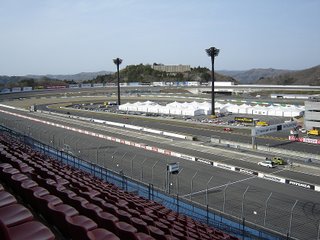
It's a big complex, with a hotel and camp area, go cart track, kiddie rides and technology centre.
Of particular rev-head interest is the Honda Collection Hall. It seems to contain examples of just about every model car, cycle or doo-dad that Honda has built. Also included is this replica of the first motor cycle ever built (by a Mr Daimler in 1885):

[Have a look at that seat. I guess they figured they were building a horse replacement, so why not have a seat that is just like a saddle.]
There is also this:

The caption says that this bicycle engine produced in 1947 was the first product to bear the Honda name.
At the other end of the scale is this shiny metal monster:

[Sorry but I seem to have missed taking a pic of the sign, so I am not sure what recent model it is.]
But for a nerdy person like me, the favourite part of the complex is that it is a home to this:
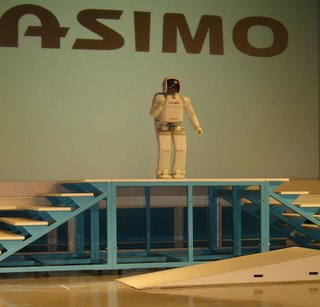

Asimo, the Honda robot, which puts on a demo a couple of times a day. He walks up the stairs, waves a lot, follows the cute human around etc. It's interesting, but also shows how we're a long, long way from Astroboy or I Robot. (Technology really evolves in unexpected ways, doesn't it? Robots, artificial intelligence and human space exploration are so far behind where the 1960's seemed to indicate we would be. On the other hand, the way everyone, even my 82 year old mother, uses the internet was hardly seen coming. Heinlein in the 40's and 50's had it nearly perfectly wrong when he had highly reliable rocketships that were navigated using slide rules. Anyway, I digress.)
This pic shows the evolution of Asimo. I like the earlier versions which are like a microwave on legs:

Once again, I refer readers to Wikipedia for more detail about this complex. Seems from that article that the design of the track has met with some complaint. Here's the official (English) website too.
Those sensitive muslims at it again
I missed this story from last week:
A giant poster covering the side of the seven-story, 126-apartment building showed a friendly-looking blonde woman lifting up her bra.... Right beneath her pink panties were posters of the flags, including those of strictly Islamic Saudi Arabia and Iran...
The campaign provoked excitement, but not the kind the management was hoping for. Men from the Muslim community came to the door complaining that showing the flags of Saudi Arabia and Iran was an insult to the Prophet Muhammad. Later, some returned in masks.
"On Friday evening we were threatened by 11 masked men who demand that we take down the Saudi Arabian flag." ....
"On Saturday night there were 20 masked men armed with knives and sticks. They threatened to get violent and even bomb the place unless we black out the Iranian and Saudia Arabian flags on the poster as well," said Lobscheid.
Far be it for me to defend brothel owners, but surely these Muslim guys should have better things to worry about than where certain national flags appear.
The brothel, by the way, is said to be:
Europe's largest brothel, which incidentally claims to be the world's only brothel with a money-back guarantee for dissatisfied customers...
The local Small Claims Tribunal equivalent might have had some interesting cases.
Something's wrong with those kiddies
George Monbiot refers to an old study in England, which I have read about elsewhere, indicating that rectifying bad diet has a clear effect on reducing violent crime. Of course, for Monbiot, this means that the government should be heavily regulating fast food advertising.
But this little part of his article is especially odd:
Which? reports that the most popular ITV programmes among two- to nine-year-olds are Dancing on Ice, Coronation Street and Emmerdale, but Ofcom plans to regulate only the programmes made specifically for the under-nines.
Coronation Street is popular with under 9 year olds??
I have never heard of Emmerdale before, but it is described on one Google link as "a popular TV soap opera set in the Yorkshire Dales." The ITV website provides this synopsis of an upcoming episode (note the title, and visit the website for a pic from the show):
Dominatricks
Tues 2nd May, 7.00pm
When Pollard hears that he may have some information on rival Irvin Ward, he heads off to meet Shirley Walsh in a local layby.
But instead of giving Pollard the information, she turns frisky and tries to give him something else!
It is all of course a set-up, which Pollard realises when the courier photographer snaps him in the act!
Back in the village and another prominent local is in danger of being caught out when Hari lies to Paddy and arranges to meet with passionate Perdy.
And finally, Jean comes up with a plan for her and Terry to stay together, in secret. What’s her idea?
Poor diet amongst kids may be a serious issue, but how about a column on the dangers of little ones watching soaps?
Adams on a downer
Today, he seems to have taken some political heart from the death of Private Kovco:
Paul Keating was hounded to his political grave by "the recession we had to have". Howard should be hounded to his by the war we had to have. For all the PM's skills in having our troops kept comparatively safe in Iraq, he put the entire country in harm's way by upping the terrorism temperature, by helping recruit a myriad more and by greatly increasing our status as a prospective target.
Now Bush's presidency is in the toilet, yet Howard has, on Iraq, remained flushed with success despite all the lies, death and destruction. But not any more. The sad death of this young man, no matter how it came about, forces attention to be paid to Howard's greatest blunder. And the fiasco of the young man's coffin is a perfect symbol for the greater fiasco of the war. The one we had to have.
I think he's clutching at straws here.I can't see that an accidental death, suicide or even murder of a soldier will have any particular resonance with the public the issue of the Iraq war generally. Accidents or mistfortune happen to soldiers all the time in training or operations; doesn't make much difference where they are.
You never know Phillip, maybe you will strike it really lucky and there will be a terrorist attack on Australian soil so you see (some) public backlash against Howard. The trouble for you will be that the other half of the population will instead see vindication of the anti-terrorism laws, and feel that the warnings about the seriousness of the terrorist threat was justified all along.
Monday, May 01, 2006
Must try harder
I didn't even know that pre-operation antibiotics were used. Well they are, but often not properly, it seems:
Patients are being placed at greater risk of acquiring harmful infections because doctors are giving them the wrong antibiotic before surgery, according to infectious disease experts.
An analysis of almost 18,000 surgical procedures in 27 Victorian hospitals, by the body that collects information for the State Government about hospital infections, shows the proportion in which the choice of antibiotic is described as "inadequate" ranges from 2.3 per cent for cardiac surgery to 56.7 per cent for hysterectomies.
The timing of antibiotic administration is also crucial. A patient should be given a shot of antibiotics ideally in the hour before the surgeon makes the first incision, and no more than two hours before. But too much antibiotic use can build resistance.
Many posts back, when I was reading about hospital doctors and hand washing, I think I read the suggestion somewhere that patients should pin a sign on their chest saying "have you washed your hands yet." (Probably a good way to get rougher treatment, I am guessing.) Anyway, seems it wouldn't hurt to ask questions of your surgeon about your antibiotic too.
Houses and power lines - an issue here soon?
I don't think I have seen this story in the Aussie press.
It interests me because I happen to live in an area where a couple of new estates have been built with allotments very, very close to high voltage powerlines. (Certainly well within the 230 foot limit refered to in the above story I am sure.)
If this gets some publicity, it will do nothing for the value of houses built in those estates.
More on women in Saudi Arabia
Back in February, I pointed readers towards a Guardian article on the glacial pace of reform for women in Saudi Arabia.
The BBC shorter article above covers similar ground, but it is such a bizarre society that I find these reports irresistable. In part:
Saudi universities are segregated, separate campuses for men and women, to the extent that male lecturers as a rule only interact with female students via videophone linkups....
Relating to a visit to a shopping centre:
There is a steady trade at the abaya shop. Next door a display of lingerie is far sexier than anything I have seen in London.
The newest move is to introduce female shop assistants here, so Saudi women no longer need to buy their underwear from male attendants.
Why on earth are men not generally allowed to stand in front of a classroom of women, but can sell them sexy underwear? Just how turned on can a man get by looking at a roomfull of black cloth bags?
And generally:
But all those I spoke to agreed, any new reforms must go slowly to avoid a backlash.
The protest by Saudi women who dared flout the ban on driving during the first Iraq war in 1991 had been disastrous, prompting a wave of conservative anger. That mistake must not be repeated this time.
Saturday, April 29, 2006
Toilets in Japan
I thought I would mention the Japanese "washlet" toilet, as they are extremely popular there, and a little intimidating to the western visitor. There is actually an extremely detailed entry on Japanese toilets on Wikipedia, which is genuinely interesting and informative, and gives much more information than I can. Nevertheless, I will give my briefer guide here.
I took a photo of the "control panel " on a typical household "washlet" toilet:

The diagrams are relatively self explanatory; even if the symbol for "butt" is a little amusing. Pressing the second or third button from the left would start a whirring sound as a little arm under the seat protrudes and water starts to squirt out, aimed with surprising accuracy to the area in question. Of course, while you are sitting there, until the water starts, you have to take it on trust that the thing is operating correctly. Standing up and checking is, presumably, a good way to get wet. (Actually, the Wikipedia entry says a pressure switch on modern ones stops the spray if you are not sitting on it. Gosh, they think of everything! However, this is not something I would want to test.)
The important thing to know is that the square "stop" button on the left ends the wash. (I am not sure if there is a time limit on the length of the spray if you don't press the stop button; I have personally never let it go on that long.) The water is warmed in the machine, and the spray pressure is adjustable, from "gentle" to "close to enema". Take my advice and pick a middle setting. (On some models it is a round dial that adjusts this, I think on this model it is the bar on the bottom left. Japanese readers feel free to correct me.) Some models have air blowing dryers in them too, but air being blown around a pre-flushed toilet tends to be smelly. I would not take that option if I were buying one.
These type of toilets are not only extremely common in homes, but also department store and restaurant restrooms. Automatic water taps and soap dispensers are also quite common in more recent public toilets.
While older public toilets in parks and subways can be pretty basic (and without a western toilet at all,) newer ones are very nice and high tech indeed. The best one I recall from this trip was upstairs in Tokyo (Train) Station in the restaurant alley area. The whole layout was nice, and with a new model of air hand dryer that actually did work. No chance to take a photo there, though...
One thing a Westerner notices about mens toilets in Japan is how there is very little care taken about whether the urinals can be seen from outside. In fact, on the bullet train, there is a urinal which has a door and a long window on it so that you just look in to see some guy's back if it is being used. I guess this is not unusual for the Europeans, with their old less than full height street pissoirs, but it strikes an Australian as odd.
I now use washlet toilets without fear, and trust that with the advantage of the ever-educational Dominion, you can too...
Friday, April 28, 2006
Pointless message
Turns out the judge's encoded message was hardly worth de-coding. I was hoping it would be more pointed, like "the Plaintiff's claim is BS".
Thursday, April 27, 2006
Himeji Castle

 The view from the top of the tower:
The view from the top of the tower: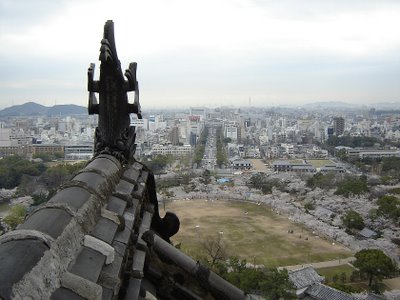
The thing on the edge of the roof is a fish, added as a good luck charm against fire. Unfortunately, the guide said, it tended to attract lightning, so now there are lightning rods attached to them.
Even though much of the inside has been rebuilt, it is by Japanese standards (where fire, earthquake and war has made really old buildings rather uncommon) very authentic. We were lucky and had a free english speaking guide for 2 hours.
Once again, Wikepedia has a good entry about this. (Gosh: it says that it featured as the headquarters for the Japanese secret police in "You Only Live Twice", the first James Bond I ever saw.)
Calm down everyone
The above article is a detailed and relatively optimistic look at the "peak oil" issue from the Economist.
The only problem I see is that optimism probably helps delay research and development of oil replacements for transport, etc, which for many reasons would be better coming sooner rather than later.
Wednesday, April 26, 2006
Some ideas on paternity fraud
I can't fault Janet's article today on the issue of paternity fraud.
Someone has suggested to her that maybe all births should be the subject of DNA testing. Wouldn't shares in the DNA test companies soar if ever that were seriously proposed!
Maybe some sort of compromise position is desirable: in the event of permanent separation with a view to divorce, then paternity testing is compulsory. The advantage of this is that the test is only done if the issue of child support is raised by the fact of separation. Currently, the Family Court is reluctant to order the mother and child to undergo testing unless the purported father has good reason to believe he is not the true father. Just having a feeling that the child might the result of (say) a suspected affair is definitely not enough.
This leaves many fathers forever suspicious of their ex-partners fidelity, and that does not help resolve issues such as property settlements which can sometimes drag on for years. Of course, some fathers may have completely ill founded suspicions, and the mother should achieve some vindication by having it proved that he is the father.
The more I think about it the better the idea sounds. Maybe some further refinements could be made: the father in any event is not allowed to recover the monies paid prior to separation towards raising the child. (If he has suspicions of infidelity during the marriage, he could ask the mother to undergo testing. If she refuses, he could always force the issue by leaving her and then the legislative requirement kicks in anyway.)
The idea might also encourage fidelity on both sides of the marriage. Husbands who have affairs with other men's wive's might be more cautious about it if it is certain that their paternity will be proved if their lover ever separates from their partner.
I don't know what the error rate of such tests is, but there should be provision to allow a party to require a repeat test by another lab if the first comes in as a big surprise.
If you think this is a good idea, write to your member of parliament, and also buys shares in a test company.
Albanese on Nuclear
It would seem that Labor's environment spokesman feels that no changes to Labor's blanket anti-nuclear policies are in the wind. His article above says that the Chernobyl disaster:
"...showed the world that nuclear power was not safe..."
And I suppose that the tens of thousands killed in the process of coal mining shows that it is safer? Comparing known decrepit Russian reactors with state of the art (or newer designs) is a bit of a stretch.
I have no fixed opinion on nuclear power, in that I am skeptical of the extremes on either side of the argument about its use. However, there is work being done on reactor designs which are inherently safer (see articles about pebble bed reactors and using thorium here and here) and these should be investigated by governments as a matter of priority.
Seems that wouldn't happen under Labor though, because nuclear is evil.
Sunday, April 23, 2006
Geography and global climate
The above article points out that the disconnection of South America from Antartica some 41 million years ago is believed to have played (and still play) a very large part in the global climate:
The world was a very different place then. Levels of carbon dioxide were three to four times today's levels and it was so warm that alligators sunned themselves in the high Arctic.
But some 30 million years ago, there was a dramatic shift in climate from "greenhouse" to "icehouse".
The rapid cooling swept over the Antarctic and, over the course of several million years, its pine trees were replaced by glaciers.
Interesting. Global warming is obviously good for alligators and pine trees. Pity polar bears and penguins are so cute.
Paging Dr Skippy
"What's that Skip? You want this man in septic shock to put his head in your pouch? Are you sure?"
Aquarium blues
The SMH reports that a drug resistant strain of salmonella has been proved (by Australian research no less) to live in fish tanks:
Australian researchers proved the link between gastroenteritis and fish tanks by showing that the strains of salmonella in patients and in their home aquariums were genetically identical.
Diane Lightfoot, a salmonella specialist at the University of Melbourne..said the study highlighted the need for care when cleaning tanks.
Fish were good pets, she said, "and fish tanks aren't to be feared. But commonsense hygiene is needed." This included washing hands after touching the water or gravel and making sure the water did not splash onto surfaces where it could contaminate food, she said.
To be fair to goldfish, the article does only refer to "tropical" fish, so maybe an unheated tank of the kind most goldfish have to put up with is not such a risk.
Saturday, April 22, 2006
Little publicity expected
The above story is 2 pronged. The study indicates that global warming due to greenhouse gases is definitely real, but the models also indicated that the "worst case" temperature rises are less likely than previously estimated.
As it contains this semi-optimistic estimate on the temperature rises, will it attract any media attention?
Here's another article that contains some moderately good news on 2 aspects of the global warming issue. As Real Climate has not attacked it yet, I am guessing that it is not controversial.
On liberal churches
Strange that the New Yorker contains a fairly conservative assessment of what is going on in the Episcopal Church, and Anglicanism more generally. This part rings particularly true:
The liberal, mainline churches are losing parishioners across the board. The conservative churches are not only growing but growing by leaps and bounds. To me, the reason seems obvious: if you’re shopping for faith, faith is the thing you want, not a watered-down version of a civics lesson. That’s not to say that the evangelical or more orthodox view is just a marketing tool, but people who get up on Sunday morning and say “I think I’ll go to church today” tend to want the genuine article, rather than a speculative “maybe it’s true, maybe it’s not true, we’re all on this journey together” exploration. Because it’s a lot easier, frankly, to stay in bed and get up in time for the first football game.
I believe that the most liberal and outright politically active Catholic church in Brisbane (St Mary's at South Brisbane) has a large number turn up for Sunday masses. But I think this is because it attracts disenchanted left-y Catholics from all over the city.
That parish has hosted a (secular) gay choir, been rapped over the knuckles for changes to the baptism rite, and featured street facing anti-John Howard signs erected on church grounds. Irritates me no end...
Friday, April 21, 2006
Science gives a tick to globalisation?
This is really interesting. Scientific American (above) has a free article available on the effect of globalisation on the poor.
The article criticises both free trade and anti-globalisation activists for claiming too much for their own side of the argument. However, it seems to me to contain much more comment and information that is "pro" globalisation rather than "anti".
The point about antiglobalisation is also that it is not just a school within a group of economists who hold this debate; it is a "popular" movement as well which brings a heap of (often) nihilistic, irrational and "let's bite the hand that feeds me" attitude that is very hard to stomach. Globalisation can have bad effects, is not the sole reason for some countries' improvement, and local governments have their role to play in regulating it too. But to deem it as fundamentally evil, as anti globalisation protesters are inclined to do, is just silly. It seems well established that if the protesters completely got their way, they would hurt the people they claim to be wanting to protect.
Anyone, it would seem that such protests have reached their zenith and may dwindle further. Good.
Enough of my mini-rant. Read the article.
Dershowitz on Moussaoui
See above for an interesting Slate article on the use and misuse of "diminished moral culpability" arguments in the American criminal system. Alan Dershowitz can write unusually clearly and succinctly for a lawyer.
Thursday, April 20, 2006
One less thing to worry about
Seems death of most life on earth by an unexpected gamma ray burst (GRB) from a nearby star is rather unlikely;
The astronomers determined that the odds of a GRB occurring in a galaxy like that one to be approximately 0.15 percent. And the Milky Way's metal content is twice as high as that galaxy, so our odds of ever having a GRB would be even lower than 0.15 percent.
"We didn't bother to compute the odds for our galaxy, because 0.15 percent seemed low enough," Stanek said.
He figures that most people weren't losing sleep over the possibility of an Earth-annihilating GRB. "I wouldn't expect the stock market to go up as a result of this news, either," he said. "But there are a lot of people who have wondered whether GRBs could be blamed for mass extinctions early in Earth's history, and our work suggests that this is not the case."
How palestinians encourage peace in their time
As far as the Abu al-Hawa family is concerned, the sale of two floors of their home on Jerusalem’s Mount of Olives was perfectly legitimate.
Mohamed Abu al-Hawa sold the real estate to a Palestinian businessman nearly a year ago, his brother Mahmoud says, earning $650,000. The money was used to buy another home on the Mount of Olives, a cherished spot overlooking Jerusalem’s Old City.
But last week Mohamed’s bullet-riddled body was found lying next to his burnt-out car on a road near Jericho. Branded a traitor for selling his property to Jews, he had been shot seven times, including once in the temple, Mahmoud said.
A detailed commentary piece on this is in the Jerusalem Post, and is well worth reading in full for its eye-opening account of this practice:
Muhammad Abu al-Hawa was buried in a makeshift cemetery on the road between Jerusalem where he lived, and Jericho where he was murdered. His body was buried there because the Palestinian Authority's mufti in Jerusalem, Ikremah Sabri, has barred all Muslims accused of selling land to Jews from being buried in a Muslim cemetery....
SINCE 1994, dozens of Arab Israelis and PA residents have been murdered on suspicion of selling land to Jews...
According to Palestinians and to Jews involved in purchasing lands from Palestinians, in the majority of cases, the Arabs murdered for the "crime" of selling land to Jews never sold land to Jews. At most they were "guilty" of having ties of friendship or commerce with Israelis. The fact that merely having relations with Jews can expose an Arab to allegations of collaboration is enough to convince most Palestinians that they shouldn't have anything to do with Israel or Israelis. So by murdering people like Abu al-Hawa, the Palestinian leadership ensures that Palestinians will be too afraid of being killed to risk peaceful coexistence with Israel.
So, not only is random terrorism against civilian Jews the only problem, they are prepared to kill their own to help delay forever any hope of peaceful co-existence.
Put this low on your tourist sites list for Japan
From the above story:
Part of a jumbo jet's broken tail fin, crushed seats and a flight data recorder that detailed how JAL Flight 123 crashed into a mountain on Aug. 12, 1985, are among the items on display at the Safety Promotion Center of Japan Airlines Corp., which opened Wednesday for a media preview.
Located in Ota Ward, Tokyo, near Haneda airport, the center exhibits components from the crippled Boeing 747 that crashed into Mount Osutaka in Gunma Prefecture, leaving 520 passengers and crew members dead in the worst single-plane accident in history.
The facility will open to the public next Monday with the aim of promoting aviation safety awareness among the public. It will also be used for employee education and training at a time when JAL has been hit by a spate of safety problems.
Would seeing this really convince the public that JAL is taking safety seriously now?
I am?
Bloggers and internet pundits are exerting a "disproportionately large influence" on society, a report by technology researchers says.
Back on dreaming..
I think this raises the "oddness"factor of the dream quite a bit, and I should have mentioned it before.
Also, how's this for a slightly odd co-incidence (although hardly one of high Jungian significance.) While on the aircraft flying into Brisbane on Monday morning, after a night of virtually no sleep, for no obvious reason the chorus of "My old man's a dustman" came to mind. That's odd, I thought, why would looking out on Moreton Bay bring that far from frequently heard chorus to mind.
On the taxi ride from the airport, the driver had some obscure radio show on that opened with the "Run rabbit" song (used for years now in that slightly creepy Victorian tourist ad) and I thought "wouldn't it be odd if 'My old man...' comes on during this show." It didn't.
Then last night, while watching "Dusty", the doco series on the ABC about staging the musical in Melbourne, they showed a scene from the show that I think was meant to be Dusty Springfield's parents (the scene may have been cut from the final version) and it ended with the chorus of "My old man's a dustman." Just for a very short time before they cut to something else.
This Dusty TV show has been on for some weeks, and I had seen a very small amount of the first couple of episodes before I went on holidays. I suppose that if it had earlier featured a snippet of that song, that may well explain it. But as I think this is a far from crucial bit of music in the stage show, that explanation seems unlikely.
However, if a sleep deprived brain can tune into an uncommon song from 36 hours in the future, why can't it tune into next weeks lotto numbers instead?
The other explanation is that I am having a very silly dream cycle. If so, I hope it will become more significant soon.
By the way, my old man was not a dustman.
Global warming causes great falling chunks of ice?
Here's an interesting story from California about two recent unexplained ice falls there.
People who read Fortean stuff know that this phenomena has been around for a long time. Even so, someone in the article still manages to speculate that global warming has something to do with it.
Apparently, some climatologists have coined a good name for these:
Lead author Jesus Martinez-Frias of the Planetary Geology Laboratory in Madrid and his colleagues have collected reports of 40 cases around the world since 1999 of puzzling falling ice, or "megacryometeors," as they call the strange objects.
Try slipping that casually into a conversation today.
Wednesday, April 19, 2006
In Kyoto
These are all around the very beautiful Kiyomizu temple. Our friend who now lives in Osaka places this temple amongst his "top 3" things to see in Japan. Good call I think.
It was a rainy day, so there is no happy blue sky in these photos. There were still lots of cherry blossoms out, though, and they look good in any light.
First pic is at the entrance:
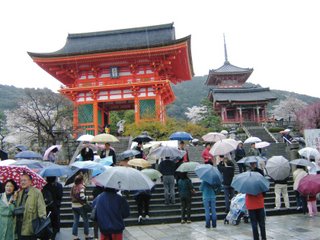
Next is looking at the balcony of the main temple building. It costs a few dollars to get in, but it is the most spectacular location (that's Kyoto in the background):
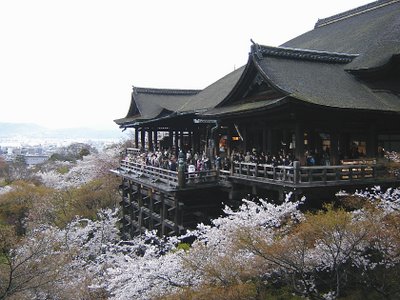
The outlook from that balcony (looking to the left in the above picture) is like this:
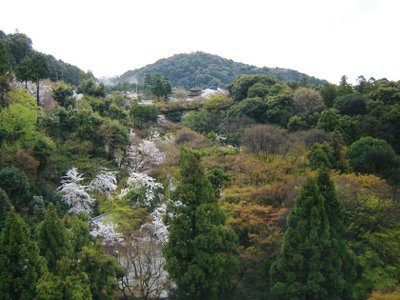
A pathway winds through those trees, but given the weather (and the company of several small children) we did not walk it.
Here's another building in the temple complex:

Wikipedia has a short but interesting little entry about this temple, for those who would like more information.
We only had one day in Kyoto, which was a pity, but it is always good to know which places you would like to re-visit and see properly.
[For some mildly geeky stuff now: all the photos are from a fairly basic 4 megapixel Sony Cybershot camera, which seems to perform quite well, even though I have never finished reading the manual and mainly leave it in "auto" mode. This trip, however, being in cold weather, did result in a high turnover in alkaline batteries - and this is in a camera that is promoted as having long battery life. Living in Brisbane, I had never realised how much the cold weather affects them.
While it seemed to me this trip that the price difference between Australia and Japan for computer stuff was somewhat less than in past visits, one thing that still seems very substantially cheaper there is camera flash memory. A 1GB Memory Stick Pro could be had for about $105, which seems awfully cheap.]
Tuesday, April 18, 2006
Some detail on Francis Fukuyama's position on Iraq
See the above article where Fukuyama responds to some of the criticism of him for having allegedly jumped ship on Iraq. But as Philip Adams now cites Fukuyama with approval (see today's over-the-top column in the Australian), it is well worth reading Fukuyama's recent article to see that his position is not as anti-Bush as Adams might like to portray:
In my view, no one should be required to apologize for having supported intervention in Iraq before the war. There were important competing moral goods on both sides of the argument, something that many on the left still refuse to recognize. The U.N. in 1999 declared that all nations have a positive "duty to protect, promote and implement" human rights, arguing in effect that the world's powerful countries are complicit in human rights abuses if they don't use their power to correct injustices. The debate over the war shouldn't have been whether it was morally right to topple Hussein (which it clearly was), but whether it was prudent to do so given the possible costs and potential consequences of intervention and whether it was legitimate for the U.S. to invade in the unilateral way that it did.
It was perfectly honorable to agonize over the wisdom of the war, and in many ways admirable that people on the left, such as Christopher Hitchens, George Packer, Michael Ignatieff and Jacob Weisberg, supported intervention. That position was much easier to defend in early 2003, however, before we found absolutely no stocks of chemical or biological weapons and no evidence of an ongoing nuclear weapons program. (I know that many on the left believe that the prewar estimates about Hussein's weapons of mass destruction were all a deliberate fraud by the Bush administration, but if so, it was one in which the U.N. weapons inspectors and French intelligence were also complicit.) It was also easier to support the war before we knew the full dimensions of the vicious insurgency that would emerge and the ease with which the insurgents could disrupt the building of a democratic state.
Overall, the article is not badly argued.
I agree strongly that it was always clear that the decision to invade was a difficult one that had to be made by balancing quite a few pros and cons. (Of course, many of the possible "cons" cited by the antiwar movement, such as fierce resistance by the Iraqi army, never materialised.) Given the nature of the decision, one had to respect those who felt that, on balance, it was better not to invade.
However, the anti-war movement does not give the same respect to those on the other side, and by and large still refuses to grant that there was any legitimate moral or practical motive for the decision. (This despite increasing documentary and other evidence that Saddam was co-operative with Islamic terrorism, the sanctions regime was not working except for his benefit, and of course the many, many citizens killed by Saddam's regime.) This is where those like Hitchens loses patience with the anti-war movement, and deservedly so.
If the invasion has taken longer than expected to result in anything like good government, this should not be grounds for gloating by the Left. That the problems of how democracy can be made to work is attracting new attention is understandable, but it was never going to be easy. Criticism of how the post invasion was handled is legitimate, but some caution needs to be exercised even there least it it fuels the very problems the critics raise.
I remain, like Tim Blair (see his Continuing Crisis column from a couple of weeks ago) a cautious optimist on the long term outcome in Iraq. But there is no doubt that the current stalemate there tests that optimism much more than I would like.
Monday, April 17, 2006
An example for Kim Beazley to follow?
The above story was reported in Japan while I was there, and is rather odd:
A French lawmaker, rushed to hospital on Friday the 39th day of a hunger strike, gave up his protest after a Japanese firm abandoned plans to close a factory in his area following a deal with the government.
Centrist deputy Jean Lassalle lost more than 20 kilograms in his battle to save 147 jobs in a factory owned by Japan's Toyal Aluminium in Accous, a town in his constituency in southwestern France.
"I feel at peace now ... For a long time now I haven't felt like I've done anything as useful," an exhausted Lassalle said during a rambling news conference at a hospital outside Paris. ...
Another triumph for French rationality!
Maybe this was the way they could have prevented the Iraq war. Chirac and all other politicians could have starved their way into convincing Bush.
Anyway, Beazley won't be endorsing this as a political method - [you can see it coming, but what the hey] - he'd have to starve at least twice as long to get results.
On cherry blossoms - and other things - in Japan


The cherry blossom viewing for many people involves claiming a patch of ground with the ubiquitous blue tarp and having food, :
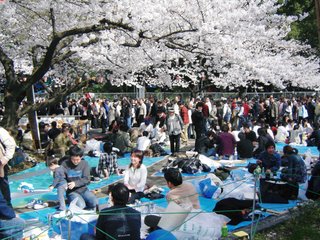
and a drink, or ten:

(I am not sure if he is in his underwear or his speedos. In any event, I reckon it was about 10 to 12 degrees at the time of the photo.)
Cherry blossoms are very pretty, and the weather forecast on TV each night shows where the cherry blossom "front" is over the whole country. (Naturally, the trees in the more northern and colder parts of Japan start flowering later than those to the warmer south.) More information on sakura trees is, as usual, at Wikipedia. (One thing they don't mention is that a spring time treat is a mochi rice sweet that comes wrapped in a sort of pickled sakura tree leaf. I can only imagine that someone centuries ago must have been really hungry to think about how to make these tree leaves edible.)
Ueno Park also has a smallish zoo, but the throng of people there on this visit made it impossible to get good photos. People are herded particularly quickly past the panda bear enclosure, and I had but a glimpse of a reclining black and white body.
By the way, as global warming would have it, Japan's winter this year was (I am told) particularly cold and snowy. Unexpectedly, I ran into snow into the northern part of Honshu only about 10 days ago. This was the scene outside the onsen hotel after a night of gentle snow:

Damn pretty, hey. (This is a good time to note that my problem with Melbourne winters is not that the minimum temperature is so low - the suburbs in Brisbane often have lower overnight temperatures - it's just that Melbourne suffers from a seemingly interminable number of grey, wet, cool to cold days without ever having the off-setting prettiness of snow.)
Onsen are the Japanese hot spring baths, and most are attached to hotels or inns (ryokan) with Japanese style rooms. Wikipedia has a good summary about them here.
Maybe most people have seen these over the years on the travel shows, but I am in a sharing mood:

This is the washing area next to the bath itself. You sit on the stools and use the shower or basin to wash yourself before getting in the bath, which in my case looked like this:

This is actually the outside bath, as you can see from the snow in the background. The temperature of the water is usually so high that sitting in it with your head and shoulders in the snowy air is pleasant. (Well, if you splash a bit of water on your shoulders every minute or so.)
There was no one around when I took these photos. They are nearly all gender segregated anyway, although that may not stop a cleaning woman being around if you are having a morning bath!
I can tell you that an absolutely essential part of all Japanese TV shows about travel within the country is the scene in which the host is sitting in the local onsen bath, quickly followed by a discussion of the local area's specialty food. (With host tasting it and saying in an exaggerated way "oishi" or "umai", meaning "delicious".)
The Japanese style room will look something like this (insert your own close relative, you can't have mine):

No beds, just futons laid out on the tatami floor in the evening for sleep. Most onsen hotels will include a very nice dinner served in the room with lots of little dishes. This one we stayed at was a "public" onsen, which is cheaper and did not have this option. However, the food served in the dining room smorgasbord style (Japanese call it "viking style", which I find kinda funny) was still very good.
Oh well, I need to catch up on some sleep. More travelogues to come.
(And, just in case you don't realise it yet, clicking on the photos above bring up enlarged versions.)
Friday, April 07, 2006
I wonder what the false positive rate is..
Malaysia will soon begin using eye-scan machines in schools to detect drug usage among teenage pupils after reports that a large number of adult drug users begin their addictions while in school, media reports said yesterday.
Deputy Education Minister Noh Omar said the 200,000-ringgit ($53,333) machines should be able to detect signs of drug use within 24 hours by using light displays to measure eye movement.
A preliminary test of the eye scans is to be conducted next month at a school in
Kuala Lumpur, he said.
Moreover, things have already been just a tad regimented for Malaysian students:
Previously, the government had been conducting random urine tests on teenage students in schools.
Why hasn't at least a private school in Australia tried flying that one?
They also apparently start young in that country:
The government revealed Thursday that a total of 17.7 per cent of drug addicts polled in Kuala Lumpur had started their addictions before the age of 13 with morphine and heroine topping the list of favoured substances.
Authorities said Malaysia has more than 500,000 addicts, but health workers fear the numbers could be much higher.
Despite Malaysia’s tough drug laws, which prescribe a mandatory death sentence by hanging for drug trafficking, drug addiction continues to be on the rise.
I wonder how reliable these figures are. They have a strong smell of 'moral panic' abut them.
Thursday, April 06, 2006
On re-thinking Iraq
All of which is the background to the most controversial decision of this editorship: the decision to support the American-led invasion of Iraq in March 2003. Our reasoning began with the fact that the status quo was terrible: doing nothing, whether about Iraq or about the Israeli-Palestinian conflict, was itself a deadly decision. It went on to the risk that Saddam still had a stock of weapons of mass destruction that if left in power he might wish to use or to sell. In the light of September 11th and the dismal results from 13 years of sanctions, we argued that wishful thinking about Saddam would be reckless. The West should invade, remove him from power, and throw its considerable resources behind the rebuilding of a free Iraq.
The ensuing three years, I hardly need to say, have seen a debacle. His WMDs turned out to be a bluff, fooling even his own generals. Elections have been held, a constitution has been written, but no government is in place. Institutions remain in tatters. Whether or not a civil war is under way is largely a semantic issue. Dozens of Iraqis are dying every day, killed by other Iraqis. So does this prove our decision wrong, just as the good outcome in ex-Yugoslavia put our “stumbling” warning in the shade?
This will outrage some readers, but I still think the decision was correct—based on the situation at that time, which is all it could have been based on. The risk of leaving Saddam in power was too high. Outside intervention in other countries' affairs is difficult, practically, legally and morally. It should be done only in exceptional circumstances, and backed by exceptional efforts. Iraq qualified on the former. George Bush let us—and America—down on the latter. So, however, did other rich countries: whatever they thought of the invasion, they had a powerful interest in sorting out the aftermath. Most shirked it.
Sounds reasonable to me.
When prayer seems to fail
Continuing an anti cat crusade...
It is vital to restrict the spread of bird flu in cats in order to protect human health, scientists warn.
Writing in Nature, scientists from Erasmus Medical Centre, Rotterdam, say the risk is being overlooked.
Wednesday, April 05, 2006
Must cancel my Mars ticket
Former NASA Payload Specialist James Pawelczyk told an Experimental Biology 2006 meeting Tuesday in San Francisco every cell in one's body could experience a high energy event with heavy metal ions during the 13- to 30-month Mars round trip.
Must try harder than this
Under the revisions -- the latest policy measure aimed at dealing with the anemic birthrate -- expecting fathers, as well as mothers, will receive a notebook to keep records on the health of mother and child from pregnancy through early childhood, LDP members said.
The name of the notebook will be changed from the "maternal and child health handbook" to the "parent and child health handbook."
I have a dream...
A couple of nights ago, I had another one of my `proof of flying` dreams. While many people may have dreams in which they can fly, I am not sure how common my (recurring) variation would be.
In the dream I have the ability to fly. Just need to get myself in the right frame of mind, and I can levitate off the ground and swan around in the air. I never fly too high, just a few metres.
During the dream, I am flying alone and unobserved, and am very aware that people will not believe that I am able to do this. I try to think of ways that I can prove it, and this usually involves a video camera taping myself in action, so to speak.
The details of the most recent dream are already sketchy, but I think I got a good tape of myself flying inside a big building, and was very happy and vindicated that people could now see clearly that I can do this. It was a very good feeling. Then I woke up and felt rather disappointed.
I have been having this dream for some years now.
I have always had flying dreams and they have always been nice. However,I find this variation sort of funny/strange, hence this post. Nevertheless, I promise not to make dream reports a regular feature here.
Monday, April 03, 2006
Tracee gets black
Have you got any blackfella in you? The man asking the question is in the process of smoking me. It seems a strange question to ask a fair-skinned, pale-eyed, blonde woman. I don't think so.
Just sounds like sale assistant talk to me. Never hurts to butter up the customer.
And for some reason, the Fire Man thinks I've got some kind of blackfella spirit inside me. I feel humbled that this healing man might think so.
Not sure why this should be humbling. Is it because there is something nicer about having that touch of primative purity in your blood?
Part of me wishes there were more whitefellas here feeling what I am feeling and the other part is savouring what I know is an extraordinary moment. It is a moment about trust. A moment that says we mean no harm to each other. A moment that tells me about our black history in the most profound way. And it is so understated it is almost overwhelming.
Yes, I always like it when something becomes so understated it circles back on itself and becomes overwhelming.
I find an older man at the sit-down fire and he wants to know my business. I tell him I've come to sit down. We talk for a while and it emerges that I do a radio show and a bit of writing. I thought so, he says. How can we get our message across?
How did he know she was a broadcaster? More of that ancient aboriginal mystical foreknowledge, or does he just own a radio? (OK, she may not have meant that to sound mystical, but she leaves that interpretation open.)
The smell of gum leaves is still in my clothes as I leave 3CR and I'm wondering if that black spirit the Fire Man talked of is something we all might have more of if we took a little time to sit down for a while.
How very, very twee, Tracee.
The Dominion on Holiday
Opinion Dominion is currently coming to you via Japan. How often posts will appear is not clear. There is the added complication of using a Japan Windows computer. It keeps trying to change things into Japanese,and doing funny things to fonts etc. So if the formatting is wonky, I apologise in advance.
One thing I am using that seems to work well is Portable Firefox, a version which fits on the smallest USB key and runs from that device (rather than doing the rather impolite act of downloading Firefox on someone else’s hard drive.) I really hate having to use IE after Firefox, and I also get to run Firefox in english,which always helps the language challenged like me.
I see that Tim Blair has also had a low Internet presence for the last few days. I am sure there must be a conspiracy theory in there somewhere.
Wednesday, March 29, 2006
Films from graphic novels/comics
You know a film has touched a sensitive nerve when a writer for the Guardian wonders whether sedition laws are appropriately used against it. The story in the Australian (above) gives some background to the film.
The Guardian's film reviewer didn't like it either:
Yet another graphic novel has been bulldozed on to the screen, strutting its stuff for an assumed army of uncritical geeks - a fanbase product from which the fanbase has been amputated. This film manages to be, at all times, weird and bizarre and baffling, but in a completely boring way. Watching it is like having the oxygen supply to your brain slowly starved over more than two hours.
Yet it has made some money in America and at Rotten Tomatoes scored a relatively high approval rating. Seems Americans are not so sensitive about movies involving bombs in the Underground. Just as long as it is not their subway.
Again, I will annoy people by criticising something I haven't seen. I predict, based on the simple fact that it is a movie that is based on a graphic novel, that it will be crap.
Hollywood really, really, has to use better material for its movies than this. Graphic novel material means a high probability that the movie will have good production design, and unrealistic or unconvincing characters.
Comic based movies were OK for a while, I suppose. But it was never a genre that had much depth. They can have a silly charm. But there have been so many dud movies based on Marvel comic heros who no adult has heard of, don't the creative types in Hollywood want to finally leave them alone? How do the writers "pitch" their material convincingly?
By the way, I like animation quite a lot, and this rant does not indicate a simple prejudice against material designed for a younger audience. I understand the appeal of a graphic novel, even though I don't read them. But please stop with the movies based on this kind of stuff.
Gerard Henderson on sedition
Yesterday's column by GH (above) notes that the Law Reform Commission is looking at the commonwealth sedition laws. Henderson notes:
On March 20 the commission published an issues paper titled Review of Sedition Laws. The issues paper seeks community consultation and the final chapter of the document contains a list of questions to which the authors of the report would like responses. Weisbrot and his colleagues make it clear they have not reached any "definitive conclusions" about their ultimate findings and recommendations.
Even so, the paper indicates that - at this stage, at least - the authors do not share the hyperbolic concern ignited by some of the critics of the federal and state governments when this legislation was canvassed late last year. For example, the paper refers to a "misunderstanding" of the construction of criminal responsibility evident in submissions to the Senate committee and comments that legal distinctions can be difficult "for non-experts and sometimes even for experts".
On a number of key issues the Law Reform Commission gives support to the case presented by the Attorney-General's Department to the Senate committee.
Seems consistent with what I had been saying earlier about the nature of the criticism about the laws.
Tuesday, March 28, 2006
A funny thing happened on the way to the verdict
From the above:
The prosecution is seeking the death penalty on the basis that Moussaoui contributed to the deaths of about 3,000 people on September 11 because he did not tell authorities about the planned hijackings.
"The reason you told lies was so you could allow the operation to go forward," prosecutor Robert Spencer demanded of Moussaoui.
"That is correct," Moussaoui replied. ....
Many analysts have said this week could prove decisive for Moussaoui.
They have also expressed fears that testimony from the unpredictable Moussaoui could undo sterling work by defence lawyers who have picked deep holes in the prosecution case for their client's execution.
The sterling work is about as undone as it could possibly be. No "if the glove doesn't fit you must acquit" style slogan is going to work this time.
Monday, March 27, 2006
Child free Europe
The BBC site above fills in some of the gaps in understanding the various reasons behind Europe's dire birth rate, a topic mentioned here quite a few times recently.
The page about Italy's low rate has some surprises:
Laura Callura, 38, who lives in Rome says she is typical of many Italian women.
"I became a mother at 36 and that's not unusual here," she says. "A lot of my friends had their first child between the ages of 33 and 38.
"Here in Italy we start life much later than people in northern Europe. University courses take longer to finish and it's harder for young people to get into the job market.
"I started my first job when I was 25 - but that is quite unusual. Most Italians don't start their career until their late 20s."